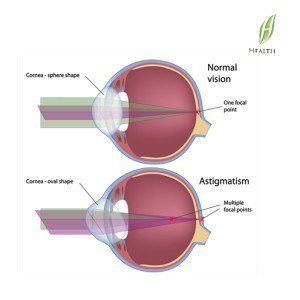Presbyopia (the loss of flexibility in the lens)
Presbyopia is part of natural aging process which people experience blurred near vision especially in dim light when the pupil is enlarged. With less elasticity of the lens, the eye has a harder time focusing up close.
Astigmatism
Astigmatism is caused by an eye that is not completely round so the eye does not focus light evenly onto the retina, the light-sensitive tissue at the back of the eye. Objects at any distance can appear blurry and fuzzy. Astigmatism may occur with other vision problems such as nearsightedness and farsightedness.
Farsightedness (Hyperopia)
The eye ball is relatively shorter, it focuses light behind the retina, so that the image on the retina appears out of focus. People may experience farsightedness differently. Some people may not notice any problems with their vision, especially when they are young since the elasticity of the lens is still in good condition, the inner eye muscles will accommodate, so that young people can still see pretty good vision at all distances, but people may experience eye strain or headaches for prolonged near work. In some cases, it is the cause of strabismus (crossed eyes). For people with significant farsightedness, vision can be blurry for objects at any distance, near or far.
Nearsightedness (Myopia)
Nearsightedness (myopia) is a common vision condition in which you can see objects near you clearly, but objects farther away blurry. It is because the eye ball is relatively longer, it focuses light in front of the retina, so that the image on the retina appears out of focus.




